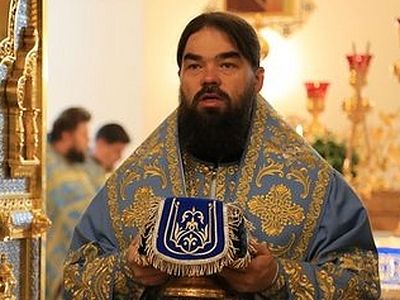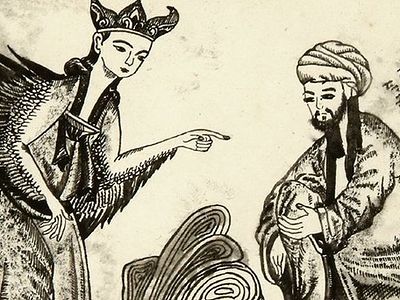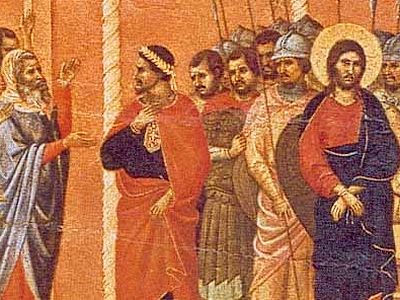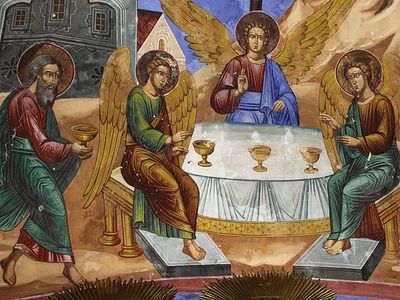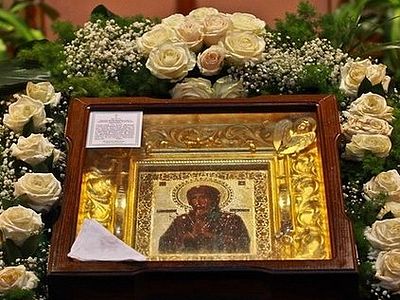We read in various places in the Holy Scriptures about encounters between Christ and Satan, or about people possessed by demons, or regarding what one might call the very essence of evil. Such passages illustrate for us vividly that life in this fallen world, obviously, is ever a contest between Good and Evil. That contest is the point of our attendance here at church, of membership in the church, and of our participation in the Holy Mysteries of the Church, such as Baptism, Chrismation, Confession, Holy Communion, and so forth. They signify our commitment to God, and they strengthen us by Divine Grace in our efforts to prevail over evil.
As Christians, it behooves us to understand more thoroughly this phenomenon called evil, so that we may better stand up to it. So, let us discuss briefly the nature of evil, drawing our information here primarily from an essay published fifty years ago under the title "The Darkness of Night" and written by one of the great Orthodox theologians of this century, Father Georges Florovsky. What follows is a mixture of quotations, and paraphrases, of Father Georges' commentary, the complete text of which appears in Creation and Redemption, published by Nordland Publishing Company in 1976 (pp. 81-91).
How is it possible that evil exists in a world created by God? For evil is precisely that which opposes itself to and resists God, perverting His designs and repudiating His ordinances. How then can evil exist if all that exists depends upon God for its existence?
There are always and everywhere causes and reasons for things. God, in fact, is the cause and reason for the existence of nearly all. But that which brings about evil is deeply peculiar. The causes and reasons of evil are always anomalous, and are more or less veiled. Evil stands outside of the ideal "chain" of God's universal causes and reasons; it splits and disfigures these things. It exists as a rival to God as Creator, but it occupies an opposite character—that of destroyer. God creates all, and evil undertakes to destroy all.
God is the source of all true power, and yet evil, which does not come from God, possesses a real power, a real force, a real violent energy. This is clearly a mystery. Its opposition to God, and His designs, is real, not imaginary, and is very active. Good, in this world, is seriously limited and oppressed by the insurrection of evil. God Himself is engaged in a struggle with these powers of darkness, and yet in this struggle there are very real losses, and there is a perpetual diminution of the good, perpetual because as good will live forever in Heaven, so evil will live forever in Hell. Universal harmony, willed and established by God, is thrown into discord, is decomposed, and the world is fallen. The entire world, in this fallen state, is surrounded by a dismal twilight of nothingness. No longer is it that world which was conceived and created by God. There are morbid innovations, new existences — existences that are "false" but nonetheless real. Evil adds something to that which was created by God, it has the ability to imitate God's creation. Its existence, its power, its ability to thwart to some real degree God's plan for the universe, are all indeed in the realm of full mystery.
But God has His response to the world of evil. God has in fact responded to evil once and for all through His Beloved Son, Who came to earth to bear the sins of the world and the sins of all humanity. As a nineteenth century Russian writer said, "Evil begins on earth, but it disturbs heaven, and causes the Son of God to descend to earth." God's response to evil was the Cross, the Crucifixion, Suffering, the Death of the Incarnate Son. Evil caused God to suffer, and He accepts this suffering to the end. And so, the Glory of eternal life shines forth victoriously from the tomb of God Incarnate. The suffering and death of Jesus Christ was a triumph, a decisive victory. It is also a triumph of Divine Love which calls us, and accepts us, without any coercion. Evil indeed continues its shadowy existence, but it is now an existence encompassed all around by the framework of God's Love for us.
One may define evil as nothingness. Certainly evil never exits by itself but only inside of Goodness. Evil is a pure negation, a privation, a mutilation. But, though evil is a void of nothingness, it is a void which exists, which swallows and devours beings. It has no power to create, but its destructive power is enormous. Evil never ascends, it always descends. The very debasement of being that it produces is frightening. Evil is chaotic, it is a separation, a decomposition constantly in progress, a disorganization of the entire structure of being.
In the human person, the place of evil, or the seat of evil, is in what the Holy Fathers of the Church call "the passions." Passions are active and have as an intrinsic part of their nature the power to entrap. Persons do not, rightfully speaking, possess passions, the passions possess them. Man is constrained and constricted, insofar as his potential is concerned, by the passions. The passions are a concentration of cosmic energies which make the human being a slave and a prisoner. They are blind, and they blind those whom they possess. The man possessed by the passions no longer acts on his own, but is acted upon. He loses even the consciousness of being a free agent. He no longer believes in freedom or the possibility of freedom, but generally ascribes his slavery to some deterministic concept of reality beyond his, or anyone else's, power to cope. As a consequence of his enslavement to evil, he loses his personality, his personal identity and he becomes chaotic, with multiple faces, or rather multiple masks. The man of passions gives every evidence of activity and energy, but in fact he is no longer genuinely free. He is nothing but a "ball" of impersonal influences. These influences hypnotize him and exercise continuous power over him.
In the world, evil is revealed to us by the suffering and sorrow that we see around us. The world is empty, cold, indifferent, a non-responding wasteland. We all suffer because of evil. The very contemplation of the universal suffering caused by evil can bring us to the brink of despair, if we allow ourselves to lose hope in the manner of non-Christians. All creation suffers, evil has generated cosmic suffering, and all is somehow poisoned by evil and its malevolent energies.
Now, the Orthodox Church teaches that man becomes truly free when he defeats the passions that hold him captive, when he subdues the sinfulness of his fallen nature. Paradoxically, it is obedience and servitude to God that leads man to true freedom, to concrete freedom, to the real freedom of adopted sons of God. God imposes a severe discipline on the man who desires true freedom, a discipline of prayer, of fasting, of watchfulness, of study, of work, of service. But, in God, and in submission to God, man's personality is restored and reintegrated in the Holy Spirit, and a true and total freedom is gained.
We read in the Holy Gospel passages wherein Christ casts out the demons from the two people afflicted, and so by His power miraculously cleanses these men of the influence of evil. Through His Church, the Orthodox Church, Christ offers each of us the ability to combat, and struggle against, and defeat evil, to cast out its influence from our lives. Satan, on the other hand, seeks to deflect us from this objective, and uses all manner of trickery to accomplish his ends. He will whisper to us that we lack time or energy to struggle against evil, and that we are incapable, even with God's help, of success. We must resist these lies!
Sin and evil makes us slaves. When we choose evil, we make a grave error, and sin then begins to enslave us. Those, for example, who choose to use drugs are often shackled to this habit for life, until death finally overtakes them. The same is true of alcohol abuse, or gambling, or other addictive evils. They are chains around our ankles, they are prisons around our souls and bodies, they rob us of true happiness in this life, and threaten our eternal happiness as well. Some well-meaning people try to encourage these people to stop their destructive ways by the use of methods that do not rely upon God, but such efforts rarely help.
There is an escape for them, however, an release for those imprisoned in the self-created cages of their sins. That escape is through the liberating Gospel of Christ Jesus. God created us for happiness and for freedom. He gave us, his most favored creatures, dominion over the whole of the universe. Through Him, through fidelity to His teaching, we may claim our birthright and defeat our Adversary, the Evil One. Let us turn our hearts to Christ, and to His Church. If we will but do that, then we will be cleansed, and set free from that Adversary whose greatest ambition is our perpetual imprisonment. May God protect us all from that Adversary!


